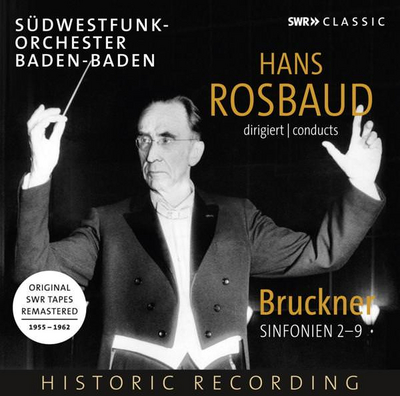
2017
Anton Bruckner
SWF Sinfonieorchester Baden-Baden
Hans Rosbaud
CD 1 Anton Bruckner: Symphony No. 2 c minor (Version 1877)
CD 2 Anton Bruckner: Symphony No. 3 d minor (Version 1888–89)
CD 3 Anton Bruckner: Symphony No. 4 E flat major (Romantic; Version 1878–81)
CD 4 Anton Bruckner: Symphony No. 5 B flat major (Version 1878)
CD 5 Anton Bruckner: Symphony No. 6 A major (Version 1879–81)
CD 6 Anton Bruckner: Symphony No. 7 E major (Version 1881–83)
CD 7 Anton Bruckner: Symphony No. 8 c minor (Version 1887–90)
CD 8 Anton Bruckner: Symphony No. 9 d minor (Version 1894–96)
All the Bruckner symphony recordings that Hans Rosbaud made for SDR (now SWR) are released here for the first time. Rosbaud took care over matters of interpretation, which took several decades to make their mark Rosbaud generally used the Haas and Nowas editions.
Hans Rosbaud is remembered chiefly as a committed performer of contemporary music. This resulted from his regular appearances in Donaueschingen, where he conducted either the world or regional premières of works by Olivier Messiaen, Pierre Boulez, Karlheinz Stockhausen, and many others. Crucially important was his conducting of the first concert performance of Arnold Schönberg’s opera Moses and Aaron in Hamburg on 12 March 1954.
Discipline, enthusiasm, detailed knowledge of orchestral instruments and faithfulness to the scores were qualities for which Hans Rosbaud was enormously admired. However, he did not consider himself exclusively a champion of the modern age and took pleasure in the entire repertoire. While maintaining a preference for conducting Mozart operas, especially in Aix-en Provence, he devoted equal attention to the works of Richard Wagner, Anton Bruckner and Gustav Mahler. It's appropriate, therefore, to release for the first time other recordings by Rosbaud, the new music specialist, and publish material from the SWR sound archives. Rosbaud produced performances of all Bruckner's symphonies for the radio broadcasting company Südwestfunk (apart from the First, which he never conducted), which is all the more reason to take a closer look at his Bruckner interpretations.
Listening to Hans Rosbaud’s Bruckner performances leaves a striking impression that he had entertained ideas similar to those by researchers Peter Gülke and Constantin Floros, who developed and supported their ideas through detailed analysis only decades later. Rosbaud never tries to hide Bruckner’s inclination to a façade of solemnity or religiosity; sometimes he rather ostentatiously accentuates this particular aspect. At the same time he emphasises that, within Bruckner’s largescale form, there is an immense wealth of contrasts with regard to thematic material. From lyrical contemplation to the organ-like pathos of the wind players, from seemingly folkloristic themes to highly dramatic buildups, Rosbaud succeeds in creating an often lengthy but always controlled and rigidly structured tonal landscape, allowing the music both to linger at moments of nearstasis, while pushing forward dramatically to the powerful climaxes.